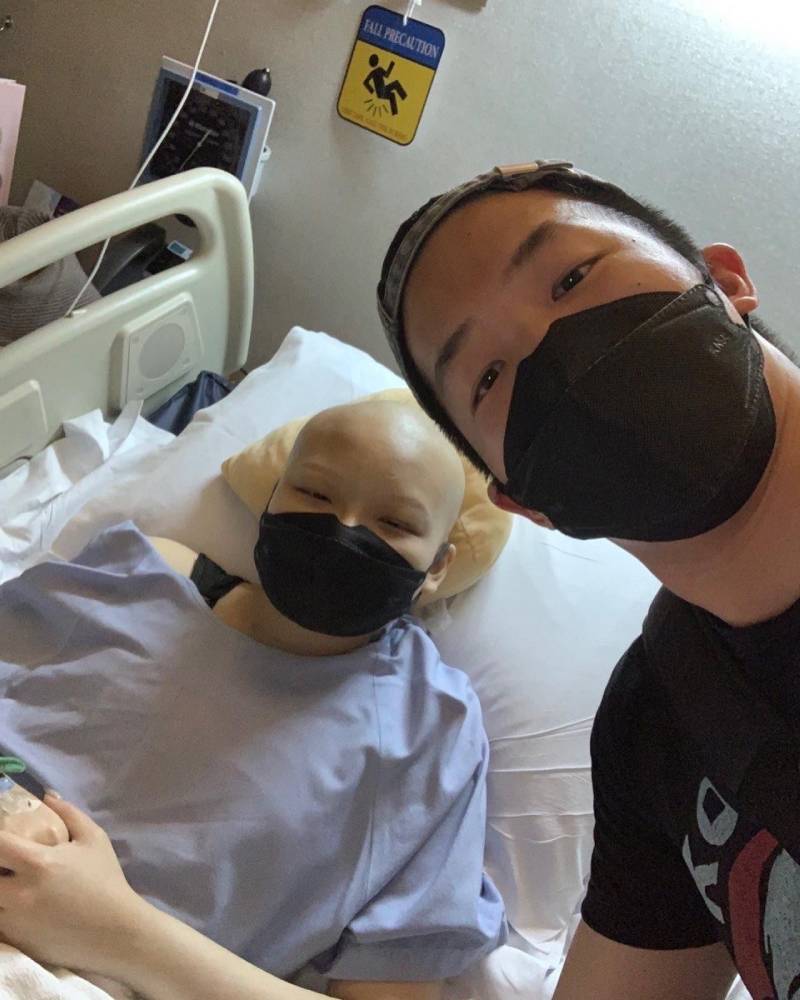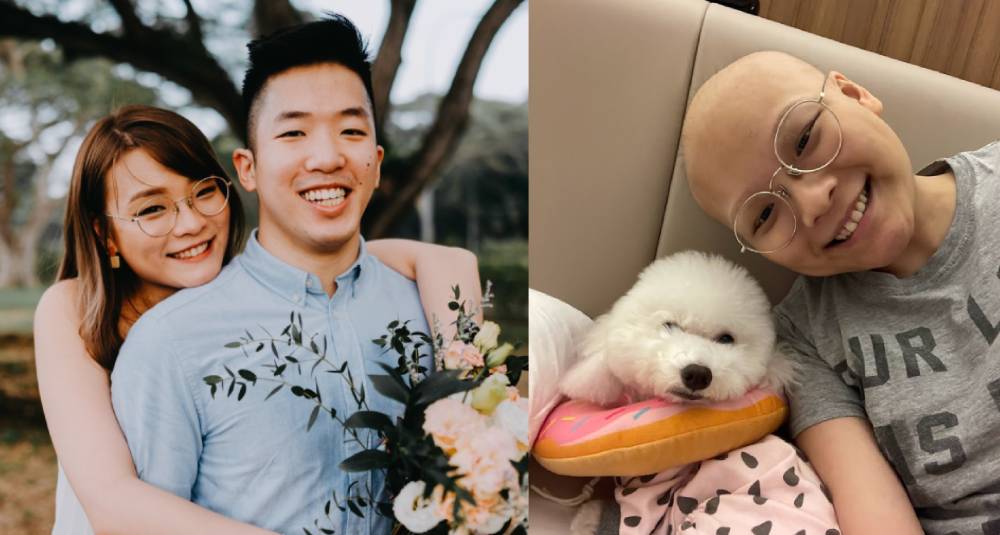In June 2021, Clarissa was just 30 years old and a newlywed when she was diagnosed with breast cancer.
It was stage 3 and in “triple negative” form, which is considered one of the most aggressive kinds of breast cancer.
Not prepared
Being a young person meant that Clarissa was not at all prepared for the disease.
As she led a relatively healthy life and did not smoke nor drink alcohol, she also wondered “Why did I get cancer?”.
It’s a question that she still doesn’t have the answer to, especially since she has no history of the disease within her immediate family.
Although fearful for the worst, Clarissa, who was working as a graphic designer then, felt inexplicably positive about her situation following her diagnosis.
“I was very scared. But also, I immediately thought, ‘Oh, I think I can survive lah, I think I'll be okay’,” she said.
Clarissa is thankful for the support from not only her family but other cancer survivors as well, who put her at ease when she spoke to them about the disease.
Her attending physician, oncologist Lee Guek Eng at Icon Cancer Centre, also helped greatly.
Lee is the programme director of the Young Women’s Cancer Program at the centre.
The programme is specifically designed to address young women’s challenges in dealing with cancer as well as support them and their loved ones during this difficult time in their lives.
As Clarissa’s diagnosis happened during the Covid-19 pandemic, she couldn’t go out much for fear of catching the virus, nor did she have much energy to.
The isolation made her feel “slightly depressed”, she admitted.
Thanks to Lee, she was linked up with volunteers, therapists and dietitians from the non-profit 365 Cancer Prevention Society so that she had a network of support to tap into if she needed.
“I just got a call and it’s cancer”
 Photo courtesy of Clarissa.
Photo courtesy of Clarissa.
Clarissa recalls how she first had an inkling that all might not be well with her health after experiencing a sudden jolt of pain in her breast while working from home.
She recalls leaning against the armrest on her chair and feeling a pain which “radiated” down to her ribs.
Despite “Googling a lot” and reading how lumpy breasts were common in young women, she paid heed to the warning signals and scheduled herself for a checkup.
An ultrasound informed her that the lymph nodes in her armpits were swollen – not a good sign. A biopsy was next performed.
The call about her cancer diagnosis came on a weekday while she was at work.
Still in a state of shock after hanging up, she immediately blurted to her colleagues, “I just got a call and it’s cancer.”
The next person she told was her husband.
Clarissa recounted how they both spent that evening crying before heading for the doctor’s appointment the next day.
She knew that it was more advanced than Stage 0 or Stage 1 as her lymph nodes were involved.
Relief washed over her when a positron emission tomography (PET) scan showed that the cancer cells had not yet spread to other parts of her body.
Treatment plan
Clarissa agreed to start on chemotherapy treatment almost immediately.
While other young women in her position might have to contend with deciding whether or not to preserve their fertility and freeze their eggs, Clarissa and her husband had already decided by then that they didn’t want kids.
So even though the topic of fertility preservation was broached by Lee, it was not a consideration for Clarissa.
Doing so would also mean that she had to delay her treatment for several weeks – time which she did not wish to lose.
And while Clarissa was prepared for the chemo-induced hair loss, it turned out that losing her crowning glory was the least of her worries.
Why?
“I mean okay yes, it was sad, but hair will grow back.”
Clarissa, however, could not avoid the usual side-effects of nausea and vomiting which she was most fearful of.
A piece of advice that helped her through that period was one given by a cancer survivor friend – that everything is temporary.
“The suffering and pain, it will pass.”
Thankfully, Clarissa was declared cancer-free after six months of treatment, which included immunotherapy and a subsequent lumpectomy that came up clear in a check.
She also went through several more rounds of immunotherapy and radiation to ensure that any remaining cancer cells were killed off, reducing the risk of recurrence.
Supporting cancer patients
 Photo courtesy of Clarissa.
Photo courtesy of Clarissa.
Clarissa’s journey has also made her realise that how a cancer patient wants to be supported can look very different from person to person.
Advice from well-meaning friends and family on what she should eat or not eat, for example, had inadvertently compounded the stress she was feeling immediately following her diagnosis.
While appreciative, her advice for others in the position as caregivers or cheerleaders, is just to be present and support their loved one through the process.
Still, Clarissa remains deeply grateful for the care shown towards her during those trying months.
“I’m thankful for my family, for my friends who stood by my side, and especially my husband… I’m thankful for everything,” she expressed, describing how her husband of just six months at the time was a “super solid source of support and my rock through it all”.
Courage to make a career switch
Clarissa may enjoy a clean bill of health today, but she admits to still feeling an underlying sense of unease – an experience which is perhaps familiar to many cancer survivors.
“It's an ongoing battle and every single day and every single minute of my life, I’ll worry about it coming back,” she acknowledged.
Gratitude, however, is one emotion that has come through strongly from her journey.
She counts herself lucky that unlike other cancer patients out there, she did not have to grapple with issues over money or lack of access to healthcare.
She is thankful too, that the immunotherapy treatment she had received was recently made available before her diagnosis.
More importantly, the cancer awakened Clarissa to the temporal nature of life.
Not only did she do more travelling following her recovery, but she also made a career switch to become an interior designer.
During her days at home resting in between her treatments, Clarissa had in part created her interior design portfolio from sketching “for fun” to pass the time.
Of her decision to quit her old job a year after she returned to work, she shared: “I wanted to try something new and I guess in a way the experience did push me to make this jump. But I’m very glad I did.”
Now with a new lease on life, Clarissa no longer puts off things that she wants to do, fully embodying the term “yolo” (you only live once).
Ultimately, who can say with certainty how much time one has left?
Breast cancer may be the most commonly-occurring cancer among women in Singapore, with patients who detect their condition later having a lower chance of recovery.
But a message Clarissa wants to share to other young persons going through a similar journey is to have hope:
“Breast cancer is one of the most common cancers in women, which also means that there's a lot of research and funding going into developing more treatments. Don’t believe the statistics so much because every person is different, every case is different.”
This is a sponsored article by Icon Cancer Centre.
Top photos by Clarissa.
If you like what you read, follow us on Facebook, Instagram, Twitter and Telegram to get the latest updates.

